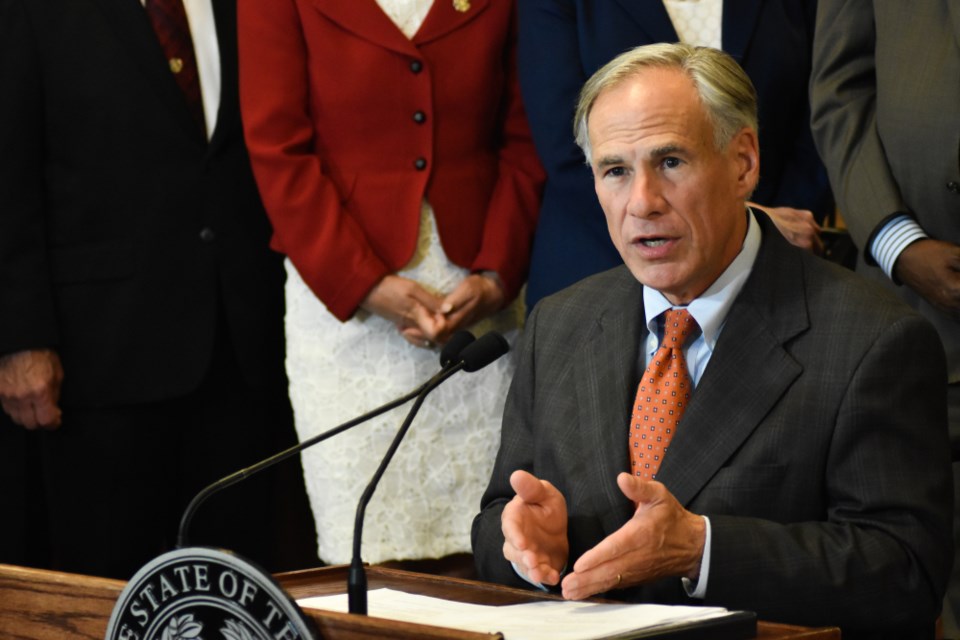Last Tuesday, Gov. Greg Abbott insisted his plan to reopen Texas was running smoothly, despite “concerning” increases in coronavirus infections and hospitalizations in parts of the state.
What was important, Abbott said, was that he had the resources to handle these increases, noting surge response teams for hot spots and the ability to again postpone elective surgeries to make more hospital beds available.
Less than a week later, those resources may be in danger. At a June 22 press conference, Abbot said that COVID-19 is spreading at an “unacceptable rate” in Texas and that it must be contained in order to keep Texans healthy and the state economy up and running.
This "unacceptable rate" is due to hospitalizations hitting new highs and the percentage of COVID-19 coming back positive, which was below 5 percent for most of May, has almost doubled.
"We must find ways to return to our daily routines while learning ways to coexist with COVID-19," he says, reminding Texans to adhere to social distancing measures and ensuring them that that all COVID-19 decisions "will be based on data as well as advice from doctors." He also notes that COVID-19 remains a problem for the state, country and the world until treatments become available to mitigate it. Closing Texas again is considered a last resort.
Last week, nine Texas mayors, including Plano’s Mayor LaRosiliere, wrote a letter urging Abbott to require face masks to stop the virus from spreading in their cities. "If mayors are given the opportunity to require face coverings, we believe our cities will be ready to help reduce the spread of this disease," they wrote.
Abbott refused, holding firm to his belief that wearing face masks should be a choice and that Texans don’t want to be patronized or penalized. He told KDFW-TV (Channel 4) in Dallas that Dallas Judge Clay Jenkins, who has been vocal about wanting stricter COVID-19 measures, is abusing his position.
“The only reason why they want to increase requirements on people in Dallas County with regard to masks is so Judge Jenkins can play sheriff and go out and try to arrest people and put them behind bars," Abbott said. “And putting people behind bars is the wrong thing. … He should not be stoking hysteria.”
Jenkins responded that he doesn’t want to jail anyone, but does want to protect Dallas from a massive COVID-19 onslaught. It's an ideal shared by the European Union, which is considering banning American travelers. With more than 2 million people infected and more than 123,000 deaths, the U.S. currently leads the world in the number of positive cases and coronavirus-related deaths.
Texas is reporting over 114,000 cases—43,499 are estimated as active—and 2,192 fatalities. In Collin County, 135 people are currently hospitalized, and there are 864 active cases. Our total bed capacity is 2,702.
Now, two months into Gov. Abbott’s plan to reopen the Texas economy, the state’s COVID-19 numbers have climbed over 100,000. As of Monday, data reported by the Department of State Health Services showed the state was averaging more than 3,500 new cases per day—in May, the average was 1,500 per day.
Phase 3 of Abbott's plan began June 3.
Over the past several weeks, Abbott has frequently said that increases in COVID-19 cases can be put down to increased testing. Hospitalization, he says, is a much more useful metric in determining not just the spread of COVID-19 but also our ability to manage it. As of Tuesday, it has been hitting record highs for almost two weeks and is now at 3,700. The positivity index, which measures the percentage of people who tested positive for the virus, is well over 9 percent and closer to 10 percent.
According to an early June study by the Kaiser Family Foundation, nationwide, nearly one in four workers face a higher risk of serious illness from COVID-19 because of their advanced age or certain health conditions. About 10 million U.S. workers are over age 65, the more vulnerable age category. Nearly 28 million workers have conditions associated with worse COVID-19 outcomes — for example, heart disease, asthma, and diabetes — and an additional 12 million are at risk because they live with workers who could potentially bring the disease home, the June study reported.
Researchers also predicted continued friction between the economy and public health.
One new hot spot, officials suggest, is no longer just dense populations but also possibly bars. In order to slow the spread, the Texas Alcohol Beverage Commission is strictly enforcing protocols in Texas bars, as Local Profile pointed out in this June 22 story.
But like many Texans, not all bar owners are listening. On Monday, TABC suspended the alcohol permits of 12 bars, four in DFW, because they violated the state's COVID-19 safety measures.
Abbott says prisons (and county jails) are also another driving force behind the increase in COVID-19 cases. Collin County’s jail recently announced four COVID-19 cases among staff and inmates.
The state of Texas has more than 54,000 hospital beds. At Monday's press conference, Abbott claimed his priority is making sure we do not hit capacity as we learn to "coexist" with COVID-19. He reminded Texans that the best way to avoid catching the virus was to stay home.
"There are three strategies that everyone can use that will go a long way to slowing and reducing the spread of COVID-19," Abbott told Texans. "One is to wear masks, two is to use frequent hand sanitizing, and three is to maintain these safe distancing practices.
"I know that some people feel that wearing a mask is inconvenient or that is an infringement of freedom," he added. "But I also know that wearing a mask will help us to keep Texas open. Because not taking action to slow the spread will cause COVID to spread even worse risking people's lives and ultimately leading to the closure of more businesses ... COVID hasn't gone away, but neither has our ability to slow the spread of it."




